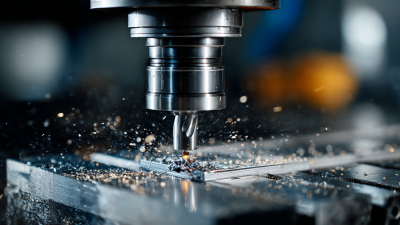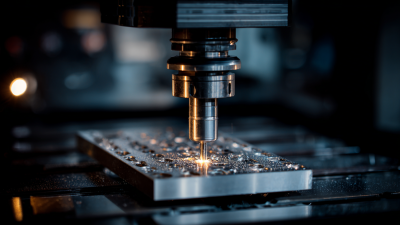Blog
The Future of Small CNC Mills in Precision Manufacturing with Industry Insights
In the rapidly evolving landscape of precision manufacturing, small CNC mills are carving out a significant niche, transforming the way small-scale operations and hobbyists approach machining. As industries increasingly prioritize precision and efficiency, the benefits of small CNC mills become more apparent, offering unparalleled accuracy, versatility, and cost-effectiveness. These compact machines empower users to produce complex parts and prototypes without the overhead associated with larger equipment, democratizing manufacturing processes. With advancements in technology and software integration, small CNC mills are not just tools; they are essential enablers of innovation for a new generation of manufacturers. This blog will explore the future of small CNC mills in precision manufacturing, highlighting industry insights and the advantages that make these machines indispensable in today’s competitive market.

Future Trends in Small CNC Mill Technology for Precision Manufacturing
The landscape of precision manufacturing is rapidly changing, and small CNC mills are at the forefront of this evolution. As industries demand increased precision and efficiency, advancements in technology are driving the capabilities of these compact machines. Emerging features such as enhanced spindle speeds, superior tool materials, and sophisticated control software are set to redefine what small CNC mills can achieve. These innovations facilitate tighter tolerances and allow manufacturers to produce complex geometries that were once reserved for larger, more expensive machinery.
Moreover, the integration of automation and smart technology is shaping the future of small CNC mills. With the rise of Industry 4.0, manufacturers are adopting intelligent systems that incorporate real-time data analytics and machine learning. This not only optimizes the machining process but also significantly reduces downtime and maintenance costs.
As small CNC mills become more connected, they will enable a higher level of customization and adaptability, accommodating the unique demands of various sectors, from aerospace to medical device manufacturing. As we look to the future, the synergy between small CNC mills and advanced technologies promises to unlock new possibilities for precision manufacturing.
Exploring Material Alternatives in Small CNC Milling Processes
As the landscape of precision manufacturing evolves, small CNC mills are increasingly being recognized for their potential to work with a variety of material alternatives beyond traditional metals. Materials such as plastics, composites, and even advanced ceramics are gaining traction in small-scale manufacturing settings. This diversification in materials not only enhances the capability of CNC mills but also broadens the range of applications for small businesses, allowing them to cater to niche markets and unique client needs.

The ability to seamlessly integrate these materials into CNC milling processes is reshaping manufacturing strategies. For instance, plastics like PEEK and nylon are lightweight yet durable, making them ideal for aerospace and automotive components. Moreover, the growth of eco-friendly materials is opening up new realms of possibility. Manufacturers are now exploring biodegradable plastics and recycled composites, reflecting a move towards sustainable practices that attract an environmentally conscious consumer base. As small CNC mills adapt to these material alternatives, they not only stay competitive but also contribute to innovative solutions that can drive the future of precision manufacturing.
The Role of Automation in Enhancing CNC Mill Efficiency
As the landscape of precision manufacturing evolves, the integration of automation in small CNC mills stands at the forefront of efficiency enhancement. Automation technologies, including advanced software and robotics, streamline processes, reducing cycle times and minimizing human error. By automating repetitive tasks, manufacturers can focus on more complex operations, ultimately boosting productivity and ensuring high-quality output.

Moreover, the data generated through automated systems allows for better decision-making and predictive maintenance. CNC mills equipped with IoT sensors provide real-time analytics, enabling operators to monitor performance metrics and identify potential issues before they become critical. This proactive approach not only prolongs the lifespan of machinery but also significantly reduces downtime, making small CNC mills a more reliable choice for precision manufacturing.
In addition, the scalability afforded by automation allows small manufacturers to adapt quickly to market demands. As industries increasingly request customized solutions, automated small CNC mills enable rapid changes in production runs without extensive reconfiguration. This flexibility empowers manufacturers to stay competitive, catering to varying customer needs while maximizing operational efficiency.
Cost-Effectiveness of Small CNC Mills Compared to Traditional Methods
The cost-effectiveness of small CNC mills in precision manufacturing has become increasingly evident as the industry evolves. According to a recent report by Freedonia Group, the adoption of CNC machinery can reduce production costs by up to 30% compared to traditional machining methods. This not only lowers operational expenses but also enhances productivity, allowing manufacturers to allocate resources more efficiently. Small CNC mills, in particular, offer flexibility that traditional methods often lack, enabling manufacturers to switch between various tasks without significant downtime.
Additionally, a study by MarketsandMarkets indicates that the global CNC machine market is projected to reach $100 billion by 2025, with small CNC mills accounting for a significant share. These machines allow for high precision and repeatability in production, which is vital for industries such as aerospace and medical device manufacturing, where tolerances can be as tight as 0.001 inches. The lower initial investment and operational costs associated with small CNC mills make them an attractive option for small to medium-sized enterprises (SMEs) looking to enhance their manufacturing capabilities. As precision manufacturing continues to drive the need for cost-effective and adaptable solutions, small CNC mills are poised to play a crucial role in shaping the future of the industry.
The Future of Small CNC Mills in Precision Manufacturing with Industry Insights
| Parameter | Small CNC Mills | Traditional Methods |
|---|---|---|
| Initial Investment | $20,000 - $50,000 | $100,000 - $250,000 |
| Setup Time | 1 - 2 hours | 1 - 3 days |
| Operating Cost (per hour) | $15 - $30 | $50 - $150 |
| Precision | ±0.005 mm | ±0.02 mm |
| Production Volume | Low to Medium | Medium to High |
| Flexibility in Design | High | Low |
| Maintenance Costs | $500 - $1000/year | $2000 - $5000/year |
Sustainability Practices in Small CNC Mill Operations and Manufacturing
In an era where sustainability is becoming increasingly crucial, small CNC mills are redefining their operations to align with eco-friendly practices. These compact machines can optimize material usage and minimize waste, an essential factor in reducing the environmental footprint of manufacturing processes. Implementing strategies such as recycling scrap materials and utilizing biocompatible lubricants ensures that CNC operations can maintain high precision while adhering to sustainable manufacturing standards.
Moreover, advancements in technology are enabling small CNC mills to adopt energy-efficient practices. Automation and IoT integration allow for real-time monitoring of energy consumption, enabling operators to adjust processes for better efficiency. By leveraging such technologies, manufacturers can not only streamline their operations but also contribute to a greener future. As the industry shifts toward more sustainable practices, small CNC mills are positioned to play a crucial role in transforming precision manufacturing into a more environmentally responsible endeavor.
The Future of Small CNC Mills in Precision Manufacturing
This chart illustrates the growth in the implementation of sustainability practices in small CNC mill operations from 2018 to 2023. The data represents the percentage of small CNC mills adopting various sustainability practices, showcasing a positive trend towards eco-friendly manufacturing.
Related Posts
-

Uncovering the Advantages of Utilizing CNC Machines in Modern Manufacturing
-

Understanding the Role of CNC Lathe Machines in Modern Manufacturing
-

Understanding Industry Standards for the Best Small CNC Machines for Metal Manufacturing
-

What is a Mini CNC Mill and How Can It Transform Your Machining Process
